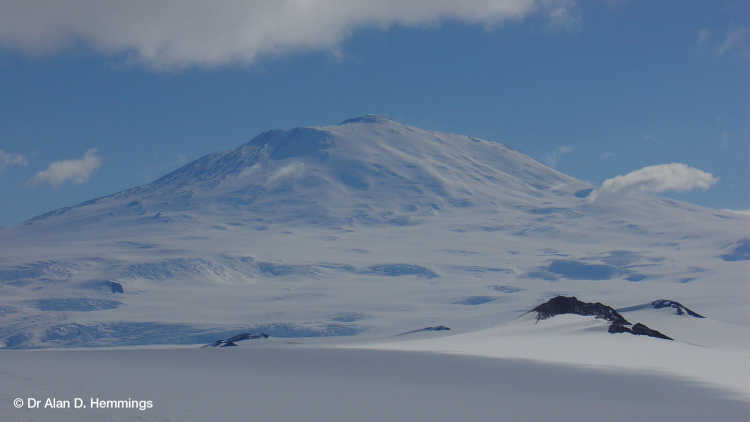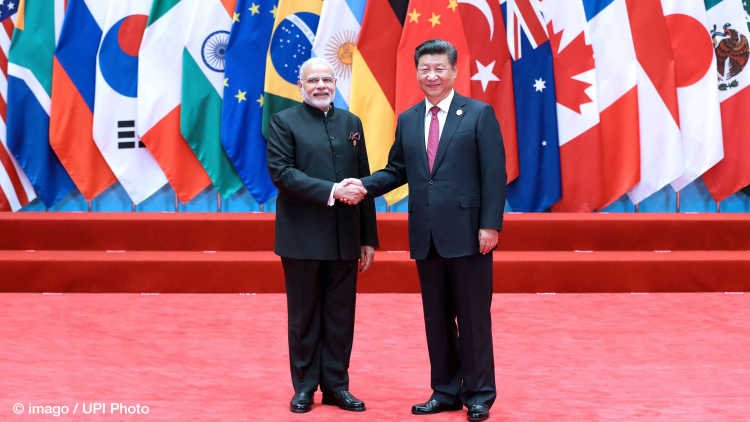- Startseite
- Publikationen
- GIGA Focus
- Now and Never: Banning Hydrocarbon Extraction in Antarctica Forever
GIGA Focus Global
Now and Never: Banning Hydrocarbon Extraction in Antarctica Forever
Nummer 1 | 2022 | ISSN: 1862-3581

The Glasgow Climate Pact called the 2020s a “critical decade” for still meeting the Paris Agreement targets. Initiatives aimed at leaving fossil fuel deposits in the ground have not extended to Antarctica, with massive untapped deposits. There is a compelling case for converting the present general moratorium on Antarctic mineral resource activity, potentially subject to review from 2048, into an explicit prohibition of hydrocarbon extraction now.
Resource interests have been at the centre of Antarctic diplomacy for decades, in no small part because of their entanglement with questions around “frozen” sovereignty claims. Global power shifts and increased geopolitical rivalries, especially in the context of the rise of China, regarding Antarctic affairs have given these debates new intensity.
To meet the goals of the Paris Agreement, current assessments are that some 60 per cent of proven hydrocarbon reserves need to remain in the ground. There is, accordingly, a compelling case for never commencing hydrocarbon-extraction activities in Antarctica, where they are presently covered within the wider minerals prohibition.
Rather than waiting for 2048, states should explicitly unilaterally commit now to never commence hydrocarbon extraction in Antarctica. This decision should be taken by individual states and by the decision-making Antarctic Treaty Consultative Parties as a community, now.
A forever ban on hydrocarbon extraction in Antarctica could also reduce the basis for geopolitical contention around resource access to a continent twice the size of Australia and where territorial sovereignty remains unresolved.
Policy Implications
As host of the 44th Antarctic Treaty Consultative Meeting (ATCM) from 23 May to 2 June 2022 in Berlin, Germany has a “once in 30 years” opportunity to facilitate a forever ban on hydrocarbon extraction in Antarctica as an important signal for revitalised Antarctic high-level diplomacy as well as for enhanced global cooperation on climate action. This requires high-level international diplomacy by Germany prior to the meeting, and the tabling of a formal proposal by the host country at the meeting itself. Since the proposal may not yet be operationalised at the 2022 meeting, Germany needs to engage with the states hosting the ATCMs coming up in the next few years.
The Need for Enhanced Climate Ambition Post-COP26: Keep It in the Ground
At the conclusion of the November 2021 United Nations Climate Change Conference (COP26) summit in Glasgow, the summit president, the Right Honourable Alok Sharma Member of Parliament, concluded that “we can now say with credibility that we have kept 1.5 degrees alive. But, its pulse is weak and it will only survive if we keep our promises and translate commitments into rapid action” (UN Climate Change Conference UK 2021). Accordingly, the Glasgow Climate Pact (2021) “stresses the urgency of enhancing ambition and action in relation to mitigation, adaptation and finance in this critical decade to address the gaps in the implementation of the goals of the Paris Agreement.”
During the conference, several initiatives for more ambitious climate action were reported. In their joint declaration on enhancing such endeavours in the 2020s, the United States and China (2021), for example, vowed to strengthen their cooperation in this “decisive decade”; more than 30 countries and financial institutions issued a statement about halting fossil fuel development overseas meanwhile, among them Germany, the United Kingdom, the US, and Canada. Spearheaded by Denmark and Costa Rica, a “beyond oil and gas alliance” (BOGA) was also launched by governments and stakeholders working together to facilitate the managed phase-out of oil and gas production. As the BOGA grouping points out, “it requires significant reductions in coal, oil and natural (fossil) gas to reach the goals of the Paris Agreement” (BOGA 2021). The International Energy Agency (IEA), in its detailed 2021 report “Net Zero by 2050,” suggested that from 2021 no new oil and gas fields should be approved for development, with the organisation’s Executive Director being explicit in media interviews: “If governments are serious about the climate crisis, there can be no new investments in oil, gas and coal, from now – from this year” (Harvey 2021).
Indeed, current assessments are that some 60 per cent of proven hydrocarbon reserves need to remain in the ground, if the goal of the Paris Agreement to keep the global temperature rise by 2050 below 1.5 degrees Celsius above pre-industrial levels is to be met. A recent Nature paper (Welsby et al. 2021) argued that the increased attention to supply-side interventions can complement more regulatory demand-side policies in this regard, with international initiatives such as the “Fossil Fuel Non-Proliferation Treaty” also building towards a more ambitious trajectory. The authors looked at regional estimates of unextractable fossil fuels and argued that Arctic hydrocarbons, too, will remain undeveloped under such a limit. It is noteworthy, however, that while there are estimated to be massive hydrocarbon sources in the Antarctic (an area of 34.5 million square kilometres – almost 7 per cent of the surface of our planet – comprising the 14 million km2 continent, an area roughly twice the size of Australia, and the 20.4 million km2 Southern Ocean extending to 60 degrees south latitude) these are not included in global inventories of proven reserves.
There are two main reasons why these Antarctic resources have remained untouched so far: (1) the economic modalities, as development and exploitation have simply been uneconomical given the Antarctic is one of the most remote and extreme environments to operate in; (2) regional concerns, based around the likely adverse environmental impacts within the region and the geopolitical challenges consequential upon the unresolved territorial-sovereignty issues in Antarctica.
The continent and the Southern Ocean play a well-documented central role in the global climate system and the effects of global warming will have dramatic and far-reaching consequences regionally as well as for the rest of the planet: the Thwaites Glacier in West Antarctica alone holds enough ice to add 65 centimetres to global sea levels. This “doomsday glacier” also acts like a plug for the wider glacier systems of the West Antarctic ice sheet – if it collapses, the rest of the ice sheet could flow into the ocean, resulting in an unstoppable speeding-up of its movement and an eventual sea-level rise of several metres (Gilbert 2021). Further, global warming seems to affect the Southern Ocean’s role as a gigantic carbon sink, with the Antarctic Circumpolar Current, a planetary conveyor belt connecting all oceans, increasingly releasing centuries-old carbon from the deep sea (Fountain and White 2021).
If we need to leave 60 per cent of proven hydrocarbons in the ground, the case for never commencing mineral resource activities in Antarctica – where it is presently prohibited and where the effects of fossil fuel-driven global warming would be catastrophic for the rest of the planet – seems compelling then.
Is Mining in Antarctica Not Already Prohibited?
The short answer to this question is yes, under the “1991 Protocol on Environmental Protection to the Antarctic Treaty” (Madrid Protocol). However this prohibition, while open-ended, may be challenged after 2048 when that Protocol turns 50. There are indications, furthermore, that some states may already be prospecting, notwithstanding this formally being one of the prohibited activities. The possibility of future minerals opportunities is clearly already informing state behaviour and planning in relation to Antarctic futures too. Meanwhile the present minerals prohibition covers more than just hydrocarbons, which may complicate the immediately pressing need to specifically address the latter in the context of limiting anthropogenic climate change.

Figure 1. The Antarctic Showing the Seven Territorial Claims
Source: Hemmings.
As an extreme and inhospitable environment, and apart from fishing, the Antarctic has been marginal to extractivist economic interests. The assumed existence and possible control of “untapped resources” has been a central concern for Antarctic treaty partners since at least the 1970s, though, in no small part because of their entanglement with questions around “frozen” sovereignty claims (Scott 2020). In Article IV of the Antarctic Treaty, signatories agreed to neither recognise nor refute existing territorial claims, in effect allowing (1) free access to the continent as well as (2) a largely symbolic maintenance of claims by relevant states.
Since 1977 there has been a moratorium on what is termed “mineral resource activities,” scientific research aside (Hemmings and Koivurova 2022). The Antarctic conception of “minerals” includes “all non-living natural non-renewable resources, including fossil fuels, metallic and non-metallic minerals.” A prohibition on Antarctic mineral resource activities, scientific research excluded, is currently in force and legally binding under Article 7 of the Madrid Protocol, which designates Antarctica as a “natural reserve, devoted to peace and science.” Article 7 is headed: “Prohibition of Mineral Resource Activities,” and comprises the single short clause: “Any activity relating to mineral resources, other than scientific research, shall be prohibited.”
Implementation of the Minerals Prohibition
While Article 7 seems rather clear in its simplicity, neither here nor elsewhere in the Madrid Protocol are any of the key terms actually defined. We have to assume that the detailed definitions provided in the earlier (and abandoned) CRAMRA, which was negotiated in the 1980s to balance resource-extractivist interests and the corresponding ones of territorial claimant states, are still legally relevant for current and future activities under the Madrid Protocol. The language used in CRAMRA defined mineral extraction as a process of “prospecting, exploiting and developing.” In consequence, the question of the boundary between “scientific research,” which is permitted, and “prospecting,” which under CRAMRA is not, is crucial. Recent Russian Antarctic minerals prospecting activity appears to exploit this uncertainty (Walters 2021).
Further, increasing geopolitical rivalry in the international system threatens to spill over into the Antarctic arena through heightened concerns around control and security of territory there (Dodds and Nuttall 2015). Especially observers from Australia and New Zealand – two claimant states and original signatories to the Treaty with histories deeply connected to mining regulation and environmental protection in the Antarctic – seem to be watching this space closely already, even though their respective views are not necessarily aligned here (Hemmings 2021; Young 2021). So, what about the aforementioned potential challenges to the mining prohibition in 2048?
The 50th anniversary of the entry into force of the Madrid Protocol will be reached on 14 January 2048, and thereafter any decision-making party may request a Review Conference – which “shall be held as soon as practical.” Any modification or amendment proposed at that Conference requires a majority to be adopted, and the latter must include three-quarters of the (26) states which were decision-making parties when the Protocol was first adopted in 1991. The agreed modification or amendment then requires ratification by three-quarters of the states which are currently decision-making parties – including all of those which were so in 1991 – to enter into force.
In relation to the mineral resource activities focus of Article 7, there are further requirements too. For the prohibition to be lifted, there needs to be a legally binding regime that includes an agreed means for determining whether, and, if so, under which conditions, any such activities would be acceptable. This regime is required to fully safeguard the interests of all states referred to in Article IV of the Antarctic Treaty – that is, the article addressing positions on territorial sovereignty – and to apply the principles thereof. Therefore, if a modification or amendment to Article 7 is proposed at a Review Conference it shall include such a binding legal regime. This sets a high bar for the lifting of the prohibition on mineral resource activities. It requires something very close to consensus, and a regulatory regime akin to CRAMRA – but that is in force. However, if these arrangements have not entered into force within three years from the date of their adoption, any party can notify the others of its withdrawal from the Protocol – taking effect two years later. At which point the state or states involved notionally become able to commence mineral resource activities subject to no legal constraints under the Antarctic Treaty System (ATS), which may anyway collapse as a result of such a contingency. The likelihood of this is difficult to assess, and would probably depend upon who the state or states in question are (Hemmings and Koivurova 2022).
Key Issues
Paramount here is that we are now more than halfway through the period before a review of the minerals prohibition can be challenged; there are indications that states have not ruled out mineral resource activities after 2048; and, the prime focus of current state interest (and prospecting by some) is in Antarctic hydrocarbons. While we may hope for a positive decision in 2048 not to seek access to Antarctic oil and gas thereafter, we are presently canalised into a pathway that may allow precisely this. Further, since the minerals prohibition is more broadly cast than just hydrocarbons, without an earlier decision we lack the ability to discriminate around the most threatening risk.
Many of us might be concerned that any or all mineral resource activities would pose a threat to the Antarctic environment during the process of exploration, at the point of extraction, and through associated logistics and transfer processes. Recall that the pathway to Antarctic minerals prohibition was concern about effects upon the Antarctic local and regional environment. While those concerns hold today, and likely in the foreseeable future, these are quite different effects and risks to those posed by further hydrocarbon extraction and use – whose consequences are global rather than regional. In the 30 years since the Madrid Protocol and its Article 7 minerals prohibition entered into force, the awareness of, and scale of, anthropogenic climate change has placed global-level environmental impacts at the top of international concerns.
Given the additional pressure points of environmental change and increased geopolitical competition in the international system, it becomes clear that consensus around the mining prohibition needs to be bolstered now. Unfortunately, the development of new and effective norms and regulatory instruments in the ATS has faltered in general and the implementation of already-agreed measures – such as the still-not-ratified liability annex – has come to a standstill. The Antarctic Treaty Consultative Meeting (ATCM) mechanism seems to have become sclerotic or even “hollowed out”: largely depoliticised and technocratic negotiations of public servants and diplomats, unable to resolve the pressing higher-level political issues at stake.
Against this backdrop, a strengthening of consensus on the mining prohibition through a revitalisation of high-level diplomacy seems much needed. Reinforcing the mining prohibiting through a focus on hydrocarbon resources as a signal for global cooperative climate action provides a promising pathway here. In the following, we make the compelling case for ruling out even the possibility of hydrocarbon extraction from Antarctica, and individual states as well as the decision-making Antarctic Treaty Consultative Parties could – and in our judgement should – make this decision as a community, now.

Figure 2. The Antarctic with the Area South of 60 Degrees South Latitude Indicated in Red
Source: Hemmings.
The Argument for “Now and Never” Banning Hydrocarbon Extraction in Antarctica
The primary case for making an immediate and unambiguous commitment to not extract Antarctic hydrocarbons is that to do otherwise is to add to our human-made planetary ecological crisis. Decarbonising the global economy is a global imperative. Agreeing not to commence hydrocarbon extraction from the Antarctic now would signal serious intent in this regard.
All Antarctic Treaty Consultative Partners could commit together now to, in our proposed wording, “never commence hydrocarbon fossil fuel extraction from Antarctica (that is, the area south of 60 degrees south latitude covered by the Antarctic Treaty and Madrid Protocol; across the Antarctic continent, surrounding islands, near-shore, continental shelf and deep seabed).” There are, of course, geographic areas here that are not explicitly covered by the ATS, such as the deep seabed – which may be implicated in mineral resource activities, but which is the responsibility of the International Seabed Authority. But the states which are decision-making parties within the ATS are key actors in these other fora too, and include the dominant states in the global system (all five Permanent Members of the UN Security Council; 14 of the G20’s member states). So these states, including Germany, may be expected to prevent conflicting approaches emerging across international instruments and institutions. This could take the form of – preferably – a legally binding “Measure” at the next ATCM, to be held from 23 May to 2 June 2022 in Berlin, Germany. No doubt there are challenges in such a project, and we consider those below. But in a world of complex geopolitics and within the field of necessary responses to the manifest global climate emergency, these are not intractable.
There is no currently sanctioned prospecting, exploitation, or development of hydrocarbon fossil fuels from Antarctica. There are some compliance issues around prospecting, but on the face of it there is already a clear declaratory position – and a case history since 1977 – of foregoing Antarctic minerals. The project here is one of a narrower commitment to not commencing a subset of this – extraction of Antarctic hydrocarbons. Foregoing something that has not yet begun is (relatively) easier and “low-cost” compared to commencing an unsustainable activity and subsequently seeking to halt it. Further, the present arrangement of Article 7 and a possible review in around 25 years leaves a “twinkling green light” for possible future mineral resource activities, and thus is already having effect in the present – howsoever the future around 2048 in fact develops. Simply put, at a time when critical discussion and planning around avoiding even worse climate scenarios is orientated (30 years out) towards 2050, it would be ridiculous to wait until 2048 before making a definitive policy choice in relation to commencing hydrocarbon extraction from the Antarctic. We should not kick the can down the road on such a decision.
Aside from the critical signalling of serious intent in relation to constraining global warming, and foreclosing actions that can only worsen it, there are shorter-term benefits in reducing the basis for geopolitical contention around resource access to a site making up some 10 per cent of our planet and where territorial sovereignty is unresolved, one which can be considered at a minimum an area of common interest: as states would no longer have to worry about control over off-limits hydrocarbon resources, sovereignty and security concerns could be defused through this focus instead on environmental protection. Whatever their geopolitical differences, the states presently contesting hegemony in the international system have a common interest – and joint concern with the wider community of states and humankind more generally – in averting climate-induced instability and damage to our share global environment. Collective proactive response to a common danger in that most internationalised and scientifically focused region, the Antarctic, should be obvious.
Currently we are in the midst of very serious tensions between Western states and Russia over Ukraine and between the US and China in relation to global hegemony respectively. Alongside that, accusations have arisen from some Western observers that China and Russia are deliberately blocking initiatives within the ATS: a recurrent friction point is around the designation of “Antarctic Marine Protected Areas,” one of which in the Weddell Sea is currently being promoted by Germany. As such, there will of course be concerns that this is all too difficult. The issue here stands at the intersection of international relations and the global environment and revolves around the central matter of coordinated responses to climate change. The challenge at hand seems, to us, to be one that sits squarely in the international relations priorities identified as important by the new German Federal Government. The right timing for such an initiative seems to be now, and such is the nature of the issue that the sooner it is addressed the better.
While the current regulatory stalemate within the ATS and increased geopolitical competition in the international system might look like impediments to any initiative for more environmental protection at first glance, the opposite seems at least as likely however. For example, the work towards the 1963 “Limited Test Ban Treaty” adopted by the US, UK, and the Soviet Union occurred at the height of the Cold War and these rival powers also managed to cooperate on successfully eradicating smallpox in the context of global health security. And, of course, the 1959 “Antarctic Treaty” – which provides the institutional architecture for the annual ATCMs at which such things can be agreed – is itself one of the most celebrated examples of global cooperation arising during the Cold War. Cooperation is possible in areas of common, existential interest, or solely as a “confidence-building measure” to manage out-of-control rivalries.
The initiative suggested here is arguably both: a strong signal for enhanced action and ambition in the face of an existential climate crisis as well as an avenue for multilateral cooperation between great powers eyeing each other with growing concern and mistrust. It does not seem too far-fetched to assume that the Russian, Chinese, and US governments all share the same interest here. Also, is there any guarantee that geopolitical competition between great powers and environmental degradation (and in consequence the conditions enabling environmental cooperation) will not worsen in the foreseeable future? The spirit of Antarctic cooperation has historically been strong even in times of war, rivalry, and political conflict – whether during the Falklands War or the Cold War itself. So far neither the ongoing crisis in the Ukraine nor increased Indo-Pacific competition has substantially leaked into Antarctic affairs. Nurturing environmental cooperation in the Antarctic might be a promising way of keeping it this way going forwards.
Lastly, one might want to consider what consequences not acting now could have. The ATS also has a responsibility during this “decisive decade” in relation the Paris and Glasgow Agreements. Enhanced climate ambition has been called for now, not in a quarter century. The Madrid Protocol and Article 7 positions were arrived at 30 years ago before the full nature and extent of climate change were widely apparent. If we wait until close upon 2048 before we start to think about it, it will be too late and pathways will already have been enabled. It is important to start laying the groundwork for any strengthening of the mining prohibition – for example through a hydrocarbon ban – now. There seems little point to a regional agreement if it cannot mobilise itself to help contribute to resolving the greatest challenge of our age.
Germany’s Rare Opportunity to Shape the Future: The Right Host at the Right Time
In 2022 Germany has not only a new federal government and the G7 chair with a focus on “strong alliances for a sustainable planet” but Berlin will host the 44th ATCM too. This represents a rare opportunity to facilitate such a commitment, as an important signal for revitalised Antarctic high-level diplomacy as well as for global cooperation on climate action more generally. As the hosting right changes in alphabetical order from year to year, the last time Germany saw an ATCM was 1991; the next opportunity, meanwhile, will not be until 2050 or later. The 2022 meeting is hoped to be the first in person since 2019, with the COVID-19 pandemic having led to the cancellation of the 2020 meeting and the 2021 iteration being convened virtually – with a consequential reduction in agenda and substance. Accordingly, the 2022 meeting is a significant one not only for Germany but the whole Antarctic community.
With a strong Antarctic science record as well as international credibility in terms of environmental stewardship, Germany is the right host at the right time to lead on this critical global climate change issue and revitalise high-level Antarctic diplomacy. Moreover, in the new coalition government, the key federal ministries tasked with Antarctic matters, the Federal Foreign Office and Environmental Ministry, are being led by senior ministers (Annalena Baerbock and Steffi Lemke respectively) with a commitment to advancing progressive green politics and offering a meaningful response to climate change internationally. The subsequent ATCMs will be held in Finland (2023), India (2024), and Italy (2025), so there may also be some opportunities for ongoing diplomatic cooperation with these states (two of whom are European Union members) to advance the forever hydrocarbon ban.
For the latter to become reality, senior German politicians need to agree that as a matter of policy their country is in favour of the Antarctic Treaty Consultative Parties adopting the position that Antarctic hydrocarbons should be left in situ. This position should be codified at one of the next ATCMs as a legally binding Measure. The relevant federal ministries, the Federal Foreign Office and Environment Ministry, need to be directed to operationalise this policy, with a timeline that includes a concerted effort at seeing it happen at the forthcoming Berlin ATCM.
Germany should present a detailed “Working Paper” (which will be translated into the four Antarctic Treaty languages) outlining the case for such a hydrocarbon position at the Berlin ATCM in late May 2022. Ministers as well as officials – including high-ranking ones, not just officers on Antarctic desks – need to promote this proposal among their opposite numbers across Antarctic Treaty decision-making states, using their many diplomatic channels. Germany’s excellent relations with Russia, China, France, and the US should be very useful in this regard. Further, Germany should consider extending an invitation as Observer at the Berlin ATCM to the Chair of the 2021 Glasgow COP and/or the Chair of the 2022 Sharm El-Sheikh COP as a means of coupling action on climate change in the two fora. Finally, Germany should enter into discussions with Finland, India, and Italy regarding subsequent promotion of this initiative at their own upcoming ATCMs.
As host of the 44th ATCM in May/June 2022, Germany has a “once in 30 years” opportunity to facilitate a forever ban on hydrocarbon extraction in Antarctica as an important signal for revitalised Antarctic high-level diplomacy as well as for enhanced global cooperation on climate action. The German hosts need to live up to this unique opportunity and responsibility in 2022. This would certainly bolster the Antarctic mining prohibition at the start of this “decisive decade” for global climate action and ambition.
Fußnoten
References
BOGA (Beyond Oil and Gas Alliance) (2021), Redefining Climate Leadership, accessed 27 January 2022.
Dodds, Klaus, and Mark Nuttall (2015), The Scramble for the Poles. The Geopolitics of the Arctic and Antarctic, Polity Press.
Fountain, Henry, and Jeremy White (2021), Rising from the Antarctic, a Climate Alarm, in: The New York Times, 13 December, accessed 27 January 2022.
Gilbert, Ella (2021), Antarctica’s ‘Doomsday’ Glacier: How Its Collapse Could Trigger Global Floods and Swallow Islands, in: The Conversation, 22 December, accessed 27 January 2022.
Harvey, Fiona (2021), No New Oil, Gas or Coal Development If World Is to Reach Net Zero by 2050, Says World Energy Body, in: The Guardian, 18 May, accessed 29 January 2022.
Hemmings, Alan D. (2021), The Geopolitics of Rebuilding New Zealand’s Scott Base in Antarctica, in: The Polar Connection, 21 May, accessed 25 January 2022.
Hemmings, Alan D., and Timo Koivurova (2022), International Regulation of Mineral Resources Activities in the Polar Regions, in: Rachael Lorna Johnstone and Yoshifumi Tanaka (eds), Routledge Handbook of Polar Law, Routledge (in press).
Scott, Shirley V. (2020), Antarctic: Competing Claims and Boundary Disputes, in: Karen N. Scott and David L. Vander Zwaag (eds), Research Handbook on Polar Law, Edward Elgar, 147–162.
Secretariat of the Antarctic Treaty System (2022), Parties, accessed 23 January 2022.
The Glasgow Climate Pact (2021), FCCC/PA/CMA/2021/L.16, accessed 27 January 2022.
United States and China (2021), U.S.-China Joint Glasgow Declaration 2021: Enhancing Climate Action in the 2020s, accessed 25 January 2022.
UN Climate Change Conference UK (2021), The Glasgow Climate Pact, accessed 27 January 2022.
Walters, Tiara (2021), Using Cape Town as a Launchpad, Russia Boasts of Supergiant Oil Fields in Antarctic Wilderness, in: Daily Maverick, 25 October, accessed 25 January 2022.
Welsby, Dan, James Price, Steve Pye, and Paul Ekins (2021), Unextractable Fossil Fuels in a 1.5 °C World, in: Nature, Volume 597, 230–234, accessed 25 January 2022.
Young, Claire (2021), Eyes on the Prize: Australia, China, and the Antarctic Treaty, Lowy Institute Policy Briefs, 16 February, accessed 27 January 2022.
Gesamtredaktion GIGA Focus
Redaktion GIGA Focus Global
Lektorat GIGA Focus Global
Regionalinstitute
Wie man diesen Artikel zitiert
Flamm, Patrick, und Alan D. Hemmings (2022), Now and Never: Banning Hydrocarbon Extraction in Antarctica Forever, GIGA Focus Global, 1, Hamburg: German Institute for Global and Area Studies (GIGA), https://doi.org/10.57671/gfgl-22012
Impressum
Der GIGA Focus ist eine Open-Access-Publikation. Sie kann kostenfrei im Internet gelesen und heruntergeladen werden unter www.giga-hamburg.de/de/publikationen/giga-focus und darf gemäß den Bedingungen der Creative-Commons-Lizenz Attribution-No Derivative Works 3.0 frei vervielfältigt, verbreitet und öffentlich zugänglich gemacht werden. Dies umfasst insbesondere: korrekte Angabe der Erstveröffentlichung als GIGA Focus, keine Bearbeitung oder Kürzung.
Das German Institute for Global and Area Studies (GIGA) – Leibniz-Institut für Globale und Regionale Studien in Hamburg gibt Focus-Reihen zu Afrika, Asien, Lateinamerika, Nahost und zu globalen Fragen heraus. Der GIGA Focus wird vom GIGA redaktionell gestaltet. Die vertretenen Auffassungen stellen die der Autorinnen und Autoren und nicht unbedingt die des Instituts dar. Die Verfassenden sind für den Inhalt ihrer Beiträge verantwortlich. Irrtümer und Auslassungen bleiben vorbehalten. Das GIGA und die Autorinnen und Autoren haften nicht für Richtigkeit und Vollständigkeit oder für Konsequenzen, die sich aus der Nutzung der bereitgestellten Informationen ergeben.












